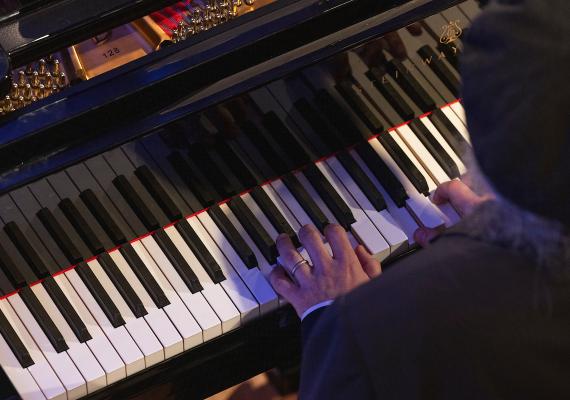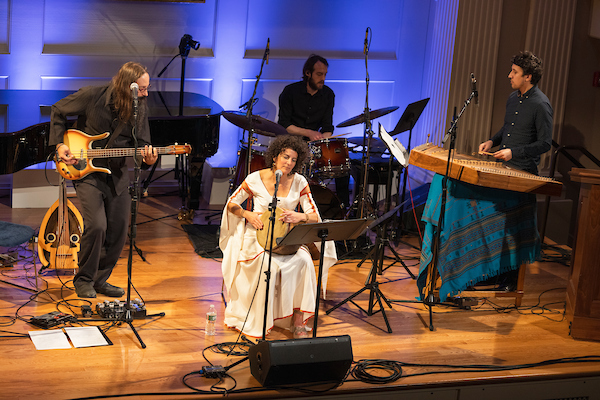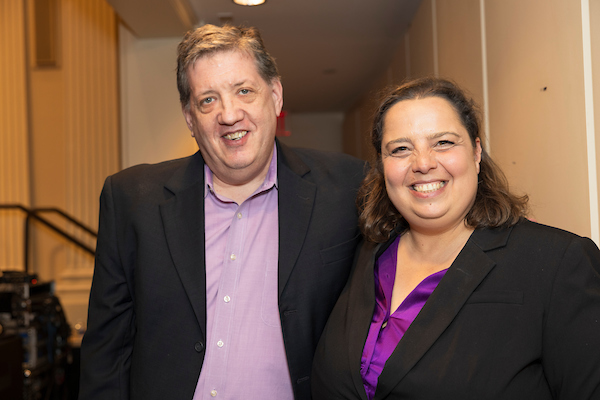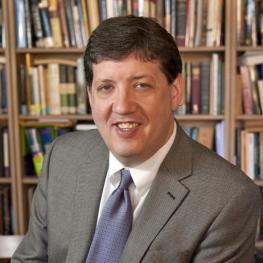The Katz Center Turns 30!
The Katz Center celebrates its 30th birthday with a concert of Jewish music.

Psoy Korolenko on piano (with Anna Shternshis narrating) at the Katz Center's 30th anniversary concert on April 14, 2024.
The academic year 2023–24 marked the 30th birthday of the Katz Center as a part of Penn.
Since our focus this year was on Jewish music, we thought it fitting to celebrate it with a concert featuring the music of former Katz Center fellow Anna Shternshis and current fellow Galeet Dardashti.
Anna led a deeply moving program about Yiddish songs that she recovered from an archive whose contents were thought to have been destroyed by Stalin. From this she reconstructed the music and history of Jews in the era of the Holocaust and its aftermath.
Scholar-musician Galeet Dardashti presented her own concert of recovery. It was a powerful evocation and reimagining of the liturgical songs sung by her grandfather, the renowned Iranian singer, Younes Dardashti.
One part of the program summoned the lost world of Eastern European Jewish culture, the other, the lost world of Persian-Jewish music, and together, they made for an unforgettable tribute to the feelings of loss, hope and humanity registered in Jewish music.
Thirty isn't all that old, but the Katz Century has a rich history that goes back much farther, developing out of an earlier institution known as Dropsie College. At the time of Dropsie’s founding in 1907, a new kind of Jewish scholarship had emerged which used the method of modern academic scholarship to illumine Jewish history, texts, and culture, and its center was in Europe. The idea behind Dropsie was to bring such scholarship to America, and it was due in no small part to Dropsie's leaders, faculty, and students that Jewish academic scholarship survived the devastation of European Jewry during the Holocaust and has been able to take root in America.

In 1993, the institution underwent another transformation, merging into Penn and eventually being renamed in honor of philanthropist Herbert D. Katz, an alumnus of the Wharton School, who provided essential leadership as the chair of the Center's board of overseers during this transitional period. Over the last thirty years, an already venerable institution has become a powerful catalyst for cutting edge, interdisciplinary research in Jewish studies.
At the core of the Katz Center is an international fellowship program that brings to Penn each year more than twenty scholars from around the world to pursue research and collaboration on a shared theme. Through this fellowship program, the Center has supported new research in a wide range of fields and disciplines, always focused on outstanding historical and textual research and expanding into areas like political thought, anthropology, legal studies, and musicology.
The Center has also striven to share and disseminate research in a variety of ways—through the Jewish Quarterly Review, the Jewish Culture and Contexts book series published by Penn Press, and Penn Libraries' Judaica collections, and collaborations such as the one we run with the Schoenberg Institute for Manuscript Studies. Reaching beyond academia, the Center aims to share the fruits of new research with the broader public through guest lectures, mini-courses, and other programs made accessible online and posted on our YouTube channel.

The Katz Center sees itself as a home—a warm, supportive, and collaborative place where scholarship and scholars can flourish—but it has also developed as a global research hub, a major point of connection and exchange between Jewish studies in the Americas, Israel, Europe, and beyond. The Center offers an annual summer school for graduate students in partnership with the Hebrew University of Jerusalem and the University of Antwerp. It has helped to form a coalition of academic institutions to support Jewish studies scholars in Ukraine, an initiative now in its third year. It works with the Weitzman National Museum of American Jewish History and other institutions to create public programs, and with CLAL, the National Center for Learning and Leadership, to connect scholars with communal leaders. More recently, it has sought to build new connections with scholarship in the Arab world.
These are the accomplishments we are honoring this year, but I need to acknowledge that the celebration is tempered by the trauma of events in the Middle East and the reverberations here in America. If we have decided to carry on with the celebration, it is in part because in Jewish tradition, sorrow and loss have never been allowed to completely suppress the need for joy. There is always some sadness present even in the most joyful moments in Jewish life, but the reverse is true as well. Jewish tradition has insisted in turn that Jews must pause mourning and grief to observe public occasions of celebration.
For this reason, we embrace this moment as an opportunity to honor the research of our hundreds of fellows, the visionary leadership of founding director David Ruderman, contributions of the Center's extraordinary staff, the support of the university's administration, and the generosity of the philanthropists who have invested so much in the Center and in Jewish studies more broadly. Many of the most enduring intellectual and cultural accomplishments of the Jews have been collaborative, including the Bible itself, the Mishnah, and the Talmud. The Katz Center is the result of such a collaboration, and we are thankful beyond words to the many people who have created and sustained the Center over the decades.
(Photos by Lisa Godfrey)
